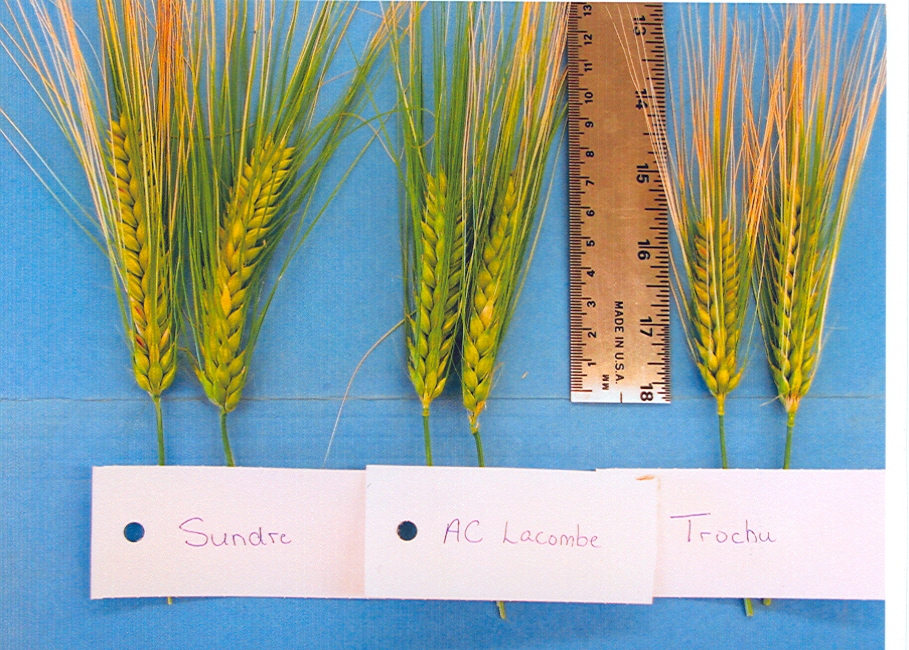Sundre
| Denomination: | 'Sundre' |
|---|---|
| Botanical Name: | Hordeum vulgare |
| Applicant/Holder: |
Alberta Agriculture and Irrigation Crop Assurance and Rural Programming Branch 1st Floor, 7000-113 Street Edmonton, Alberta T6H 5T6 Canada |
| Breeder: |
James H. Helm, Alberta Agriculture and Rural Development, Lacombe, Alberta |
| Agent in Canada: |
Mastin Seeds R.R. # 1 Sundre, Alberta T0M 1X0 Canada Tel: 403-556-2609 |
| Application Date: | 2006-04-05 |
| Application Number: | 06-5416 |
| Grant of Rights Date: | 2007-12-13 |
| Certificate Number: | 3093 |
| Date rights surrendered: | 2023-11-29 |
Variety Description
Varieties used for comparison: 'Trochu' and 'AC Lacombe'
Summary: 'Sundre' is a six-row, spring, feed barley that has a longer and wider flag leaf than the reference varieties 'Trochu' and 'AC Lacombe'. The collar of 'Sundre' is v-shaped, whereas 'Trochu' has a platform collar. At the beginning of anthesis, the lemma awns of 'Sundre' have no anthocyanin colouration , while the awns of 'Trochu' and 'AC Lacombe' have weak anthocyanin. 'Sundre' has slightly taller plants and a longer spike than the reference varieties.
Description:
YOUNG PLANT: semi-erect growth habit, green coleoptile
PLANT AT TILLERING: no pubescence on sheaths of lower leaves, semi-erect growth habit
FLAG LEAF: very few recurved, weak pubescence on blade, strong glaucosity on sheath, weak pubescence on sheath, no anthocyanin on auricles, weak pubescence on auricle margins
SPIKE: mid-season emergence, v-shaped collar, semi-erect to horizontal attitude, weak glaucosity, tapering shape, medium density
RACHIS FIRST SEGMENT: medium length, weak curvature
MEDIAN SPIKELET: glume and awn shorter than the grain
LEMMA AWNS: no anthocyanin at tips (at anthesis), shorter than spike, smooth (few barbs at tip)
KERNEL: medium length and width, very weak or no anthocyanin colouration of nerves of lemma, whitish aleurone layer, husk present, long rachilla hair, weak spiculation of inner lateral nerves of dorsal side of lemma, no hairiness of ventral furrow, clasping lodicules, horseshoe shaped basal markings
AGRONOMIC TRAITS: fair lodging resistance, good shattering resistance, good tolerance to straw breaking and neck breaking, fair tolerance to drought
REACTION TO DISEASE: resistant to scald (Rhynchosporium secalis), false loose smut, black semi-loose smut (Ustilago nigra) and covered smut (Ustilago hordei), moderately susceptible to stem rust (Puccinia graminis), spot blotch (Cochliobolus sativus) and net blotch (Pyrenophora teres), susceptible to fusarium head blight (Fusarium graminearum), and true loose smut (Ustilago nuda), very susceptible to common root rot (Cochliobolus sativus, Fusarium spp.) and Septoria speckled leaf blotch (Septoria passerinii)
Origin & Breeding History: 'Sundre' originated from the cross BT 636/SD503. The line BT 636 originates from Agriculture and Agri-Food Canada, at Lacombe, Alberta. SD503 was registered as the variety 'Tukwa' and released by the Field Crop Development Centre (Lacombe) in 1992. The original cross in the development of 'Sundre' was made in 1992. The F2 was grown in a bulk population at Lacombe, Alberta in 1993. The F3 population was grown in El Centro, California in 1993-94 with selected heads brought back to Lacombe for further bulk nurseries in 1994-96. In 1996 heads were selected from the F6 bulk to be grown out as F7 headrows. The line H92068001 was selected from these headrows in 1997 to enter into yield testing. Purification of this line also took place with the bulking of 161 breeder lines at the F13 generation in 2003 to form the first breeder seed of this variety. Selection criteria used for this variety included grain yield, test weight, 1000 kernel weight, lodging resistance, disease resistance and maturity. This line was also evaluated for silage production.
Tests & Trials: Trials for 'Sundre' were conducted during 2005 and 2006 at The Field Crop Development Centre, Lacombe, Alberta. The trials were grown as a randomized complete block design. Each plot was replicated 3 times. Plots were 8 rows, cut back to 2.5 metres in length. The rows were 14 cm apart and plots were 45 cm apart. Measured characteristics were based on 30 measurements.
Comparison tables for 'Sundre' with reference varieties 'Trochu' and 'AC Lacombe'
Flag leaf length (cm)
| 'Sundre' | 'Trochu' | 'AC Lacombe' | |
|---|---|---|---|
| mean | 20.8 | 16.8 | 18.9 |
| std. deviation | 2.59 | 1.78 | 1.89 |
Flag width (mm)
| 'Sundre' | 'Trochu' | 'AC Lacombe' | |
|---|---|---|---|
| mean | 16.4 | 15.6 | 15.5 |
| std. deviation | 1.92 | 2.14 | 1.59 |
Spike length, excluding awns (cm)
| 'Sundre' | 'Trochu' | 'AC Lacombe' | |
|---|---|---|---|
| mean | 8.7 | 6.9 | 7.7 |
| std. deviation | 1.94 | 0.65 | 0.69 |
Plant height, including awns (cm)
| 'Sundre' | 'Trochu' | 'AC Lacombe' | |
|---|---|---|---|
| mean | 91.5 | 87.5 | 98.9 |
| std. deviation | 5.02 | 5.6 | 4.9 |
Kernel weight
| 'Sundre' | 'Trochu' | 'AC Lacombe' | |
|---|---|---|---|
| grams per 1000 kernels | 34.2 | 32.9 | 33.4 |
Click on image for larger view

Barley: 'Sundre' (left) with reference varieties 'AC Lacombe' (centre) and 'Trochu' (right)
- Date modified: